 |
 |
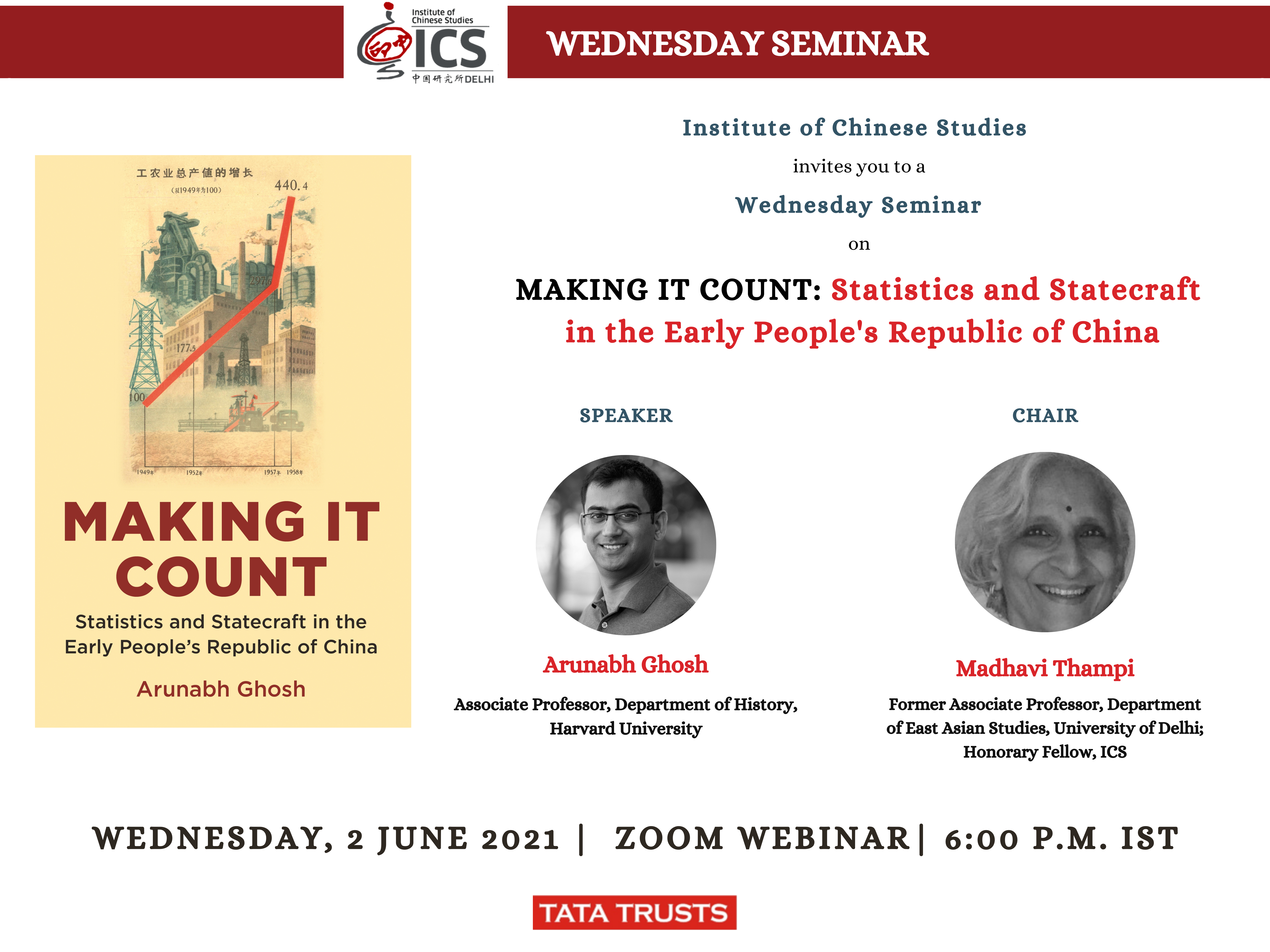 |
| |
| Making it Count: Statistics and Statecraft in the Early People’s Republic of China |
|
Arunabh Ghosh
Wednesday Seminar | Zoom Webinar |2 June 2021
|
| |
| In 1949, at the end of a long period of wars, one of the biggest challenges facing leaders of the new People's Republic of China was how much they did not know. The government of one of the world's largest nations was committed to fundamentally reengineering its society and economy via socialist planning while having almost no reliable statistical data about their own country. Making It Count is the history of efforts to resolve this "crisis in counting." Drawing on a wealth of sources culled from China, India, and the United States, Arunabh Ghosh explores the choices made by political leaders, statisticians, academics, statistical workers, and even literary figures in attempts to know the nation through numbers. Ghosh shows that early reliance on Soviet-inspired methods of exhaustive enumeration became increasingly untenable in China by the mid-1950s. Unprecedented and unexpected exchanges with Indian statisticians followed, as the Chinese sought to learn about the then-exciting and new technology of random sampling. |
| Listen >> |
|
|
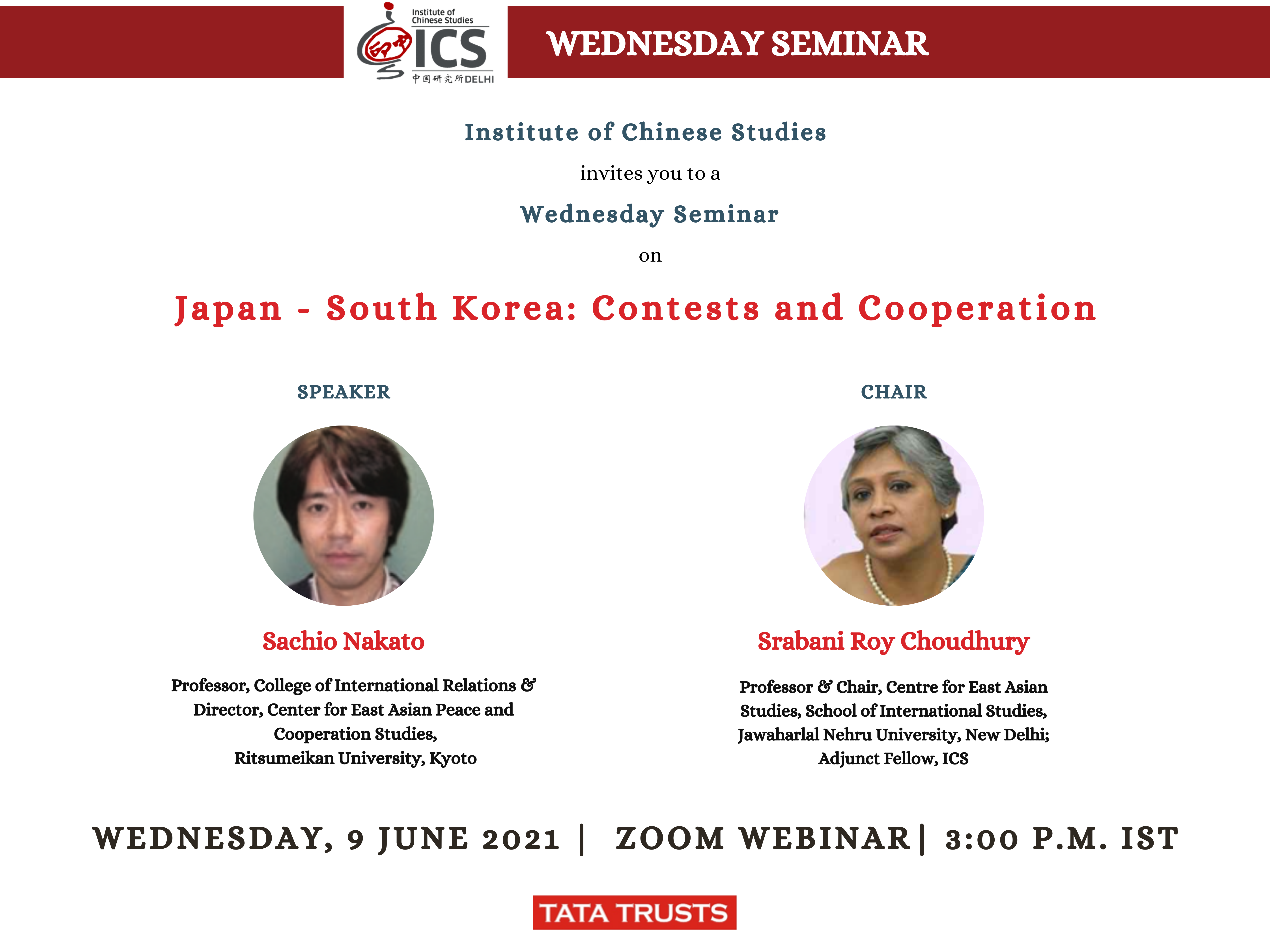 |
| |
| Japan-South Korea: Contests and Cooperation |
|
Sachio Nakato
Wednesday Seminar | Zoom Webinar |9 June 2021
|
| |
| This seminar explored the dynamics of Japanese-South Korean (ROK) relations regarding the North Korean nuclear threat, under the Park Geun-hye (and Moon Jae-in) and Shinzo Abe (and Suga) governments. In particular, it explored how security cooperation between Japan and South Korea differed following the third and fourth (as well as fifth and sixth) North Korean nuclear tests. In contrast to existing explanations, this lecture focused on the convergence and divergence of strategic priorities between the two countries, apart from external threat perception. It argued that the credibility of the U.S.' commitment to protect its allies is a constant, regarding the increasing North Korean nuclear threat. Therefore, it is not considered a defining factor in Japan-ROK relations. Finally, cooperation and conflict over historical issues influence security relations between the two countries, but they are not constant variables. This lecture argued that convergent/divergent interactions in strategic priorities, and the degree of discord and cooperation in historical issues between the two nations determine the levels of security cooperation between Japan and South Korea. |
| Watch >> |
|
|
.png) |
| |
| At the Forefront, In the Background: The Indo-Tibetan Border Police in India’s China Policymaking |
|
Jabin T. Jacob
Wednesday Seminar |16 June 2021
|
| |
| Why is the Indo-Tibetan Border Police (ITBP) relatively invisible compared to the Indian Army and the Ministry of External Affairs in India's management of the boundary with China? Whether in terms of its role or the efficacy of this role along the Line of Actual Control (LAC), the ITBP receives considerably less attention in the press or from analysts than the other two organizations. This has been the case even in the past year of high tensions with China on the LAC in eastern Ladakh. Indeed, the ITBP has largely been ignored in the general analysis of Indian security institutions. This presentation attempted to address this gap using the context of India's China policymaking. It begins with an overview of the structure and general conditions of work in the ITBP before highlighting specific factors that limit its work and its influence, including mission creep and inter-agency competition. In the process, the presentation drew some lessons not just about India's approach to China but about Indian policymaking in general. |
| Read More >> |
|
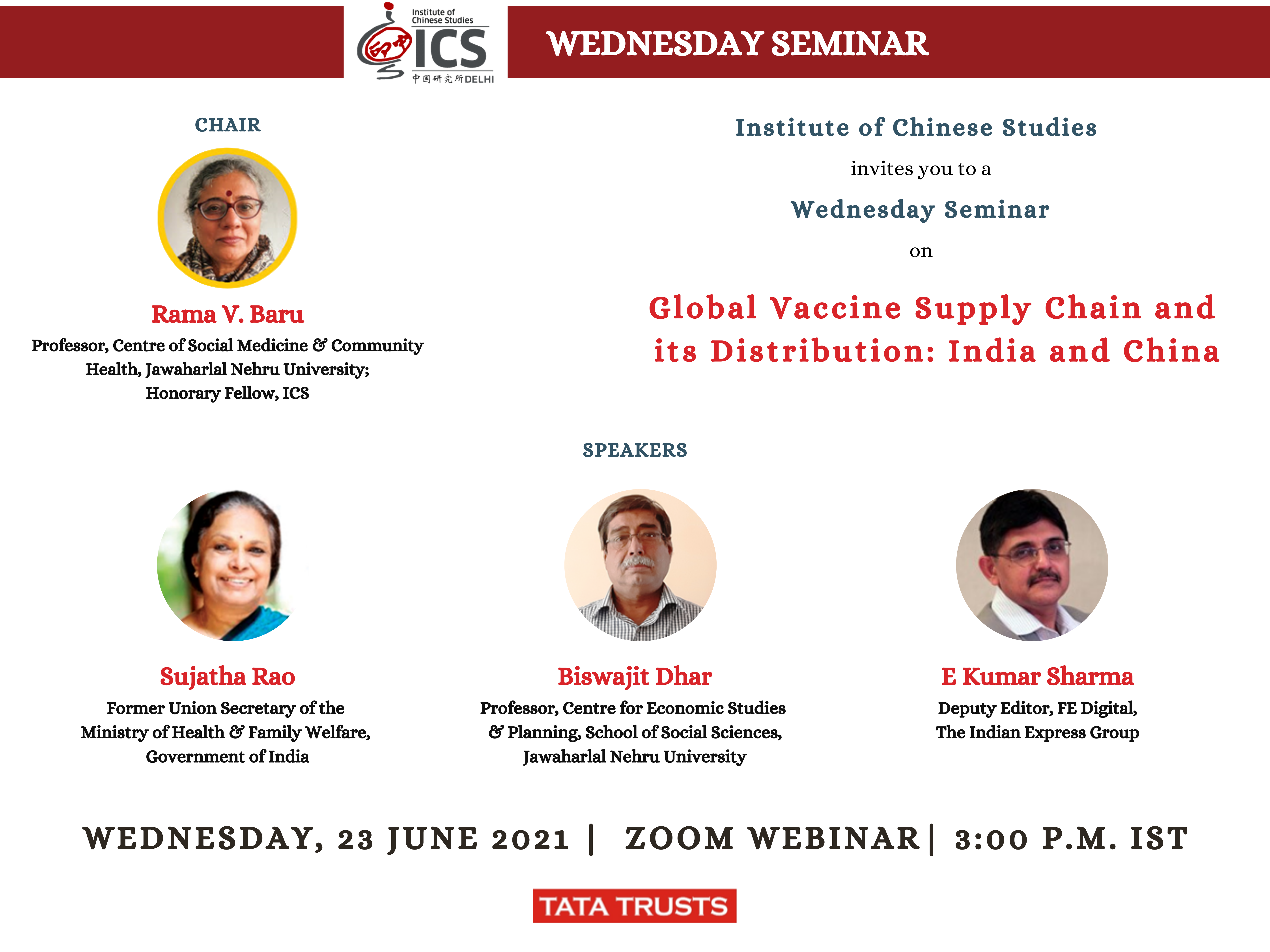 |
| |
| Global Vaccine Supply Chain and its Distribution: India and China |
|
Sujatha Rao, Biswajit Dhar, E Kumar Sharma
Wednesday Seminar | Zoom Webinar |23 June 2021
|
| |
| As the second wave of the COVID-19 pandemic ravaged India, the importance of availability, accessibility and distribution of the vaccine gained visibility. The major producers of the Covid-19 vaccine are India, China, United States, UK and Russia. Except the United States all other major producers have exported vaccines to several developing countries. Several developed countries have pursued policies of vaccine nationalism thereby undermining the importance of vaccine equity. Both China and Russia have managed to strike a balance between their domestic demand and exports of vaccines. However, India, which is the largest producer of vaccines, has failed to meet both the domestic demand and export obligations. This focussed and highlighted the recent debates on vaccine nationalism and equity. |
| Listen >> |
|
|
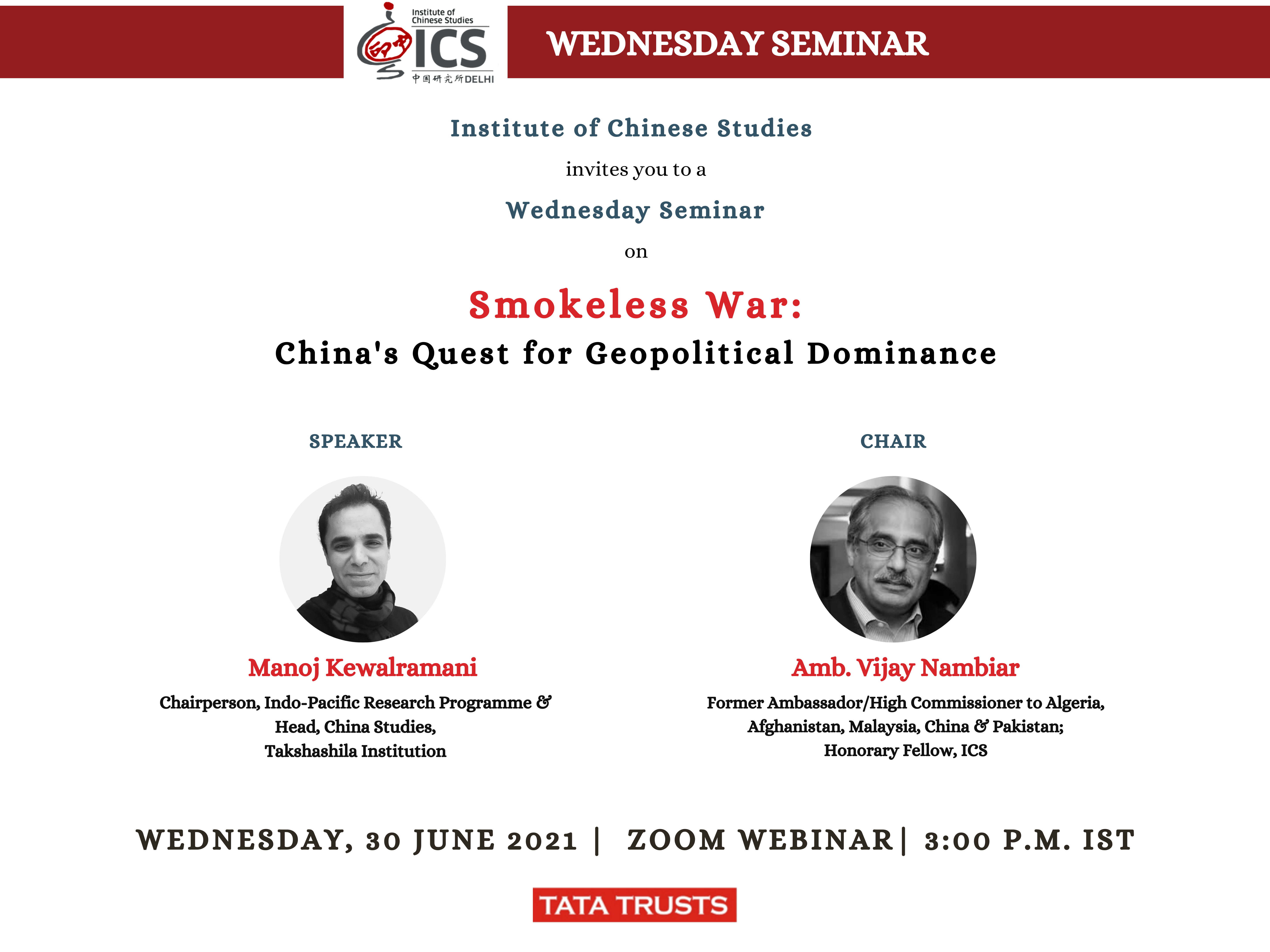 |
| |
| Smokeless War: China’s Quest for Geopolitical Dominance |
|
Manoj Kewalramani
Wednesday Seminar | Zoom Webinar |30 June 2021
|
| |
| In January 2020, the COVID-19 outbreak in China was viewed as a black swan event, threatening the Communist Party's rule. Two short months later, however, China appeared to have controlled the virus, while the rest of the world struggled to respond. As country after country-imposed lockdowns of varying strictness and the human cost began to rise, geopolitical frictions flared up over the origins of the virus, along with Beijing's early failures, diplomacy and discourse. 'Smokeless War: China's Quest for Global Primacy' offers a gripping account of the Communist Party of China's political, diplomatic and narrative responses during the pandemic. Drawing on the latest academic research and Chinese language sources, the book discusses the Party-State's efforts to achieve greater discourse power and political primacy, as it sought to convert a potentially existential crisis into a historic opportunity. |
| Listen>> |
|
|
|
|
|
|
|
|
|
|
|
|
|
|
|
| |
 |
|
|
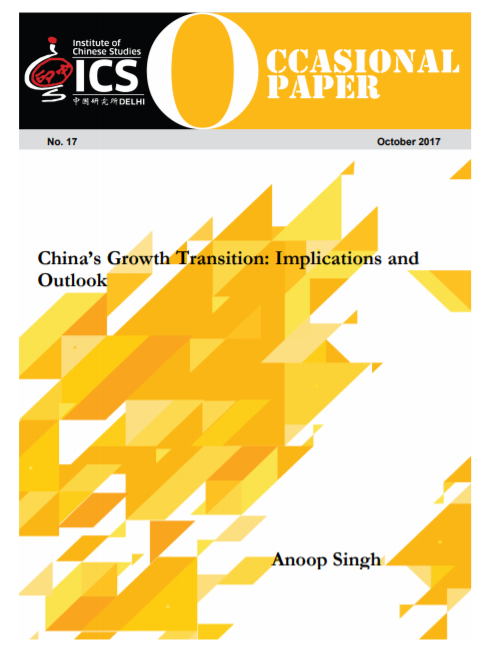 |
| ICS OCCASIONAL PAPER |
| |
|
An Empirical Analysis of Trade Performance between China and the BRICS
|
|
Dr. Radha Raghurampatruni|Issue No. 73 | June 2021
|
| |
| When we look back at the last decade, it is clear that the BRICS countries have already begun to play a significant role on the world stage. Between the years 2001 and 2019 intra-BRICS trade increased more than 15 times. Virtually unscathed from any of the global crisis, these countries are poised for a strong long-term, growth. However, the costs inflicted by the COVID-19 pandemic on the society and economic activity of the five countries have halted this trend. Further the growth of the BRICS economies requires creation of their closer partnership in trade and investments. |
| Read more >> |
|
|
| |
 |
| ICS OCCSAIONAL PAPER |
| |
|
The 8th Congress of Workers’ Party of Korea, Kim Jong-un’s Thoughts and Future of North Korea
|
|
Kuri Sravan Kumar|Issue No. 74 | June 2021
|
| |
North Korea is an enigma, and it follows a leader-centric approach. The Workers Party of Korea is the highest-ranking body of North Korea. Due to the Covid-19 pandemic, last one year onwards, North Korea is in self-isolation and world hardly have any clue about Kim Jong-un and DPRK.
This paper attempt is to discuss the 8th congress of Workers Party of Korea, 2021, especially its focus on Kim Jong-un speeches and congress resolutions and its remarks on Inter-Korean relations, North Korea-America relations, and North Korea’s economic plan. This is a delve for understanding and analysing Kim Jong-un’s thoughts and its implications. |
| Read more >> |
|
 |
| ICS ANALYSIS |
| |
| Rising Xenophobia and Anti-Asian Racism amid COVID-19: A Theoretical Lens |
|
Shamim Ahmed Khan,Masnun Mahi,Mohammad Zainuddin|Issue No. 130 | June 2021
|
| |
| Since the onset of the COVID-19 pandemic, news articles have reported increased incidents of racial abuse, verbal harassment, cyberbullying, vandalism, physical assault and other forms of mistreatment toward others, particularly Asians. People of Asian descent and appearance have been stigmatized for spreading the virus. Sinophobia, xenophobia and anti-Asian racism have become widespread in the shadow of the current pandemic. This article attempts to explain the rising instances of racism and discrimination through the lenses of information asymmetry, political opportunism, social stigma and social identity theories. Such a discussion in the context of COVID-19 allows a deeper understanding of how racism against people of colour operates and legitimizes at individual and institutional levels. |
| Read more >> |
|
|
|
| |
| ICS BLOGS |
| |
| The ICS Blog is a platform for an open dialogue that aims to inform and enlighten, especially young scholars and analysts on contemporary issues related to China and East Asia. |
| |
|
|
| |
 |
| |
|
| |
 |
| |
|
|
| |
|
|







